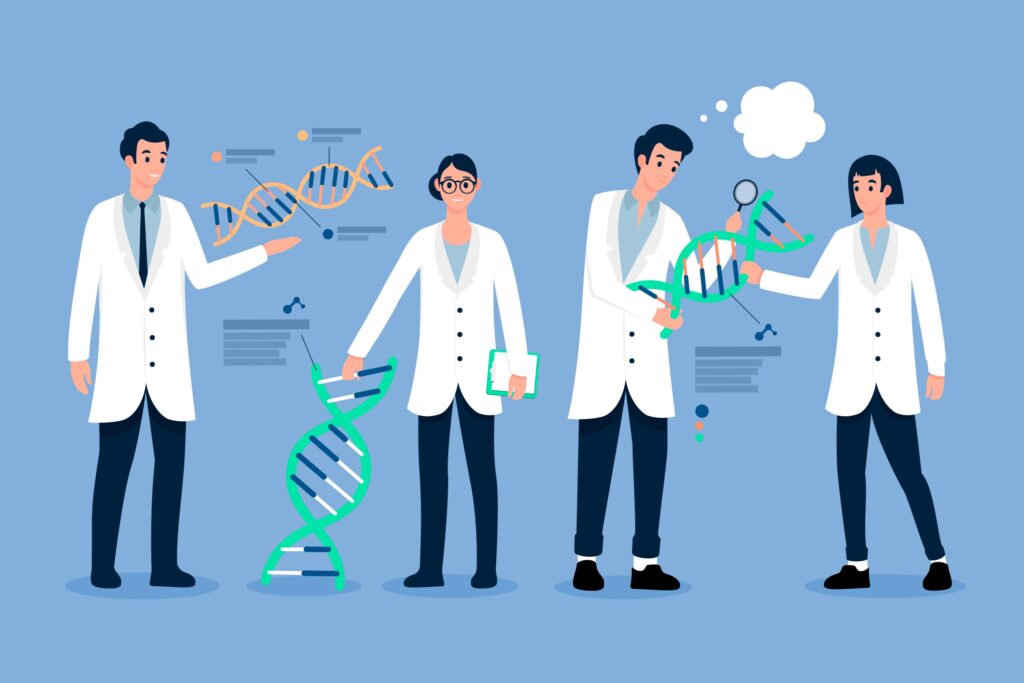Change requires great effort. Whenever we embark on the journey of understanding using the quantum model of reality and discover that we can influence our personalities and behaviors, the ability to change them for the better becomes apparent.
The most frequent question that arises is: Can we influence our genes to promote better health? Or are we inevitably bound by our genetic expression?
In this article, I will delve deeply into challenging the conventional belief about our genes being static entities, suggesting that they are not immutable.
Table of Contents
Introduction
A brief overview of the long-standing belief in genetic determinism
For years, the prevailing notion was that our genes held the ultimate power over our health and characteristics. This belief profoundly shaped our understanding of genetics.
Introduction to the concept of epigenetics
Some decades ago, the scientific community declared that the environment is the causative factor that determines the activating and deactivating of gene expression for 95% of the diseases.
It was the emergence of the new field of science epigenetics that blew away the old notion of genetic determinism.
Understanding Epigenetics
Definition of epigenetics and its role in gene expression
Epigenetics involves controlling gene activation without altering the DNA sequence itself. It’s the conductor orchestrating our genetic symphony.

How external environmental factors influence epigenetic changes
From diet to stress to toxic environmental elements wield influence over our genetic switches, altering gene expression patterns.
However, there is still some confusion regarding environmental factors.
How do we explain that individuals with multiple personality disorders have a disease in one personality but not in the other, even though they are the same person?
What might explain the instances where two identical twins share the same genes, yet one develops the family illness while the other does not?
Healthcare providers are constantly exposed to pathogens, yet they do not remain ill all the time. Why is that?
While we may not control the outer environment of our lives, we can change our inner state of being, irrespective of external circumstances, to prevent disease-inducing genes from activating.
How internal factors influence epigenetic changes
To comprehend how we can regulate our internal environment, it’s crucial to grasp the nature of genes.
Our body operates akin to a protein factory. Various cells produce distinct proteins to fulfill their designated functions. For example, stomach cells generate enzymes, essential for digestion.
Likewise, our skin cells manufacture proteins known as elastin and collagen. Often, beauty products advertise the enhancement of collagen to maintain skin health. Genes are responsible for producing these proteins.
Role of genes in adaptation
Organisms adapt to their environment by adjusting their gene expression to ensure survival, especially in extreme conditions.
For instance, if a group of mammals migrates to an area with harsh temperatures, their genes gradually activate across generations to cope with the cold.
This adaptation results in the production of new proteins that lead to thicker hair and fur, both of which are composed of proteins.
Epigenetics Point Towards the Possibility of Change
Epigenetics suggests that we can influence our gene expression, reshaping our future toward better health, longevity, vitality, and a robust immune system.
It also proposes that genes are entirely changeable, much like the brain’s malleability. This era marks extensive research in epigenetics. However, it seems perplexing that genes can transform without altering DNA, as traditional gene studies teach us that DNA controls all life, managing gene expressions within cells.
To simplify, consider the genetic sequence as a blueprint of a clothing shop. You scan this blueprint onto your laptop and then use editing software to modify its appearance without changing the original blueprint. Similarly, genes can alter their actions by chemical changes, producing different proteins, yet the fundamental blueprint remains unchanged.
By altering our thoughts, emotions, and habitual reactions, we can send different signals to our genes. Cells respond to new information by creating thousands of variations, akin to modifying colors in a picture using Photoshop.
Practically, one can achieve this by adopting a healthier diet, eliminating toxins from the environment, fostering optimistic thinking patterns, practicing meditation to reduce stress, and improving sleep quality.
Our ability to communicate new information to our cells empowers us to believe in desired future outcomes rather than succumbing to present circumstances.
Stress Causes Impairment of a Physiological Regulatory Mechanism
As we age, our skin typically undergoes changes. It tends to sag because, over time, genes responsible for producing certain proteins begin to wear out, resulting in the creation of lower-quality proteins.
As we progress in age, the quality of skin proteins like collagen and elastin diminishes.
Likewise, prolonged periods of frustration, guilt, anxiety, anger, or depression prompt the body to continuously produce stress hormones.
After a decade or two of sustained internal imbalance due to these negative emotions, the body’s equilibrium falters, leading to the onset of disease.
What lies ahead if we remain in the same circumstances, holding onto beliefs passed down from our parents, reliving identical past experiences every day, and leading predictable lives?
Our bodies won’t generate new genes for a different future; instead, they’ll rely on the genes inherited from previous generations. We won’t evolve but remain stuck in familiar, habitual patterns.
How Quantum Model Can Help Influence Our Genes
In the quantum model of reality, it’s asserted that thoughts alone have the power to generate emotions. According to epigenetics, it’s the environment that communicates with genes, potentially influencing the onset of disease or the healing process.
By mastering elevated emotions even before experiencing them physically, we can influence gene expressions.
For instance, feeling gratitude for a healed body prior to actual healing can prompt the body to believe the healing has occurred. This belief sends signals to the cells, enabling the production of health-enhancing chemicals.
Consequently, these chemicals trigger genetic responses to generate proteins that function as a remedy for diseases.
Research Highlighting the Influence of Elevated Emotions on Disease
In a study1 conducted in Japan, researchers examined the impact of emotional states on disease among two groups of insulin-dependent type 2 diabetes patients.
Both groups had their fasting blood-sugar levels measured as a baseline. One group watched a comedy show while the other viewed a dull lecture before consuming a meal.
The results were significant: the group that enjoyed the comedy show experienced notably lower post-meal blood sugar levels compared to the group watching the lecture.

Initially, researchers speculated that laughter might have caused a physical reaction, such as muscle contractions, affecting glucose levels. However, further analysis of the individuals who enjoyed the comedy revealed changes in 23 different gene expressions.
These findings indicated that the emotional state triggered by laughter had a direct effect on gene expression related to blood sugar regulation.
The study highlighted how emotions can influence gene expression, altering the body’s internal chemistry.
It also referenced extreme stress causing sudden changes in genetic expression, such as hair turning gray overnight, showcasing the powerful impact of emotions on genetic responses and internal environments.
| Research Title | Authors | Date of Publication | Summarized Results |
|---|---|---|---|
| “Psychological Stress and the Human Immune System: A Meta-Analytic Study of 30 Years of Inquiry” | Suzanne C. Segerstrom and Gregory E. Miller | 2004 | Found a significant relationship between psychological stress and immune system function, suggesting that chronic stress may weaken immune responses. |
| “Emotional Stress as a Trigger of Cardiovascular Events: What Is the Role of Inflammation?” | David S. Sheps, et al. | 2014 | Investigated the role of inflammation in linking emotional stress to cardiovascular events, highlighting the potential mechanisms involved. |
| “Depression and Immunity: Inflammation and Depressive Symptoms in Multiple Sclerosis” | Anna L. Kivimäki, et al. | 2015 | Explored the association between depression, inflammation, and symptoms of multiple sclerosis, indicating a potential link between psychological factors and disease progression. |
| “Stress, Inflammation, and Yoga Practice” | Kiecolt-Glaser, J.K., et al. | 2010 | Examined the effects of yoga practice on stress and inflammation, suggesting potential benefits for immune function and overall health. |
| “The Effects of Psychological Stress on Immune Function: A Meta-Analysis” | Suzanne C. Segerstrom and Gregory E. Miller | 2004 | Conducted a meta-analysis of studies investigating the impact of psychological stress on immune function, concluding that stress can indeed suppress immune responses. |
Power of Mental Rehearsal on Muscle Strength
In a study2 outlined in the 1992 Journal of Neurophysiology, eight subjects were divided into groups to explore the effects of mental rehearsal versus physical exercise on muscle strength.
- One group physically exercised a finger, resulting in a 30 percent increase in finger strength.
- Another group solely mentally rehearsed the exercises, astonishingly demonstrating a 22 percent increase in muscle strength.
- A control group did neither physical nor mental exercises.
Surprisingly, both the physically active and mentally rehearsing groups showed increased muscle strength. This highlights the power of mental rehearsal in impacting physical changes without actual physical experiences.
Similar experiments3 comparing physical activity with mental rehearsal, such as bicep curls, yielded comparable results. Both physical exercisers and mental rehearsers exhibited increased strength. Notably, the mental rehearsal group showed physiological changes without physical activity.
This study suggests that when the body physically changes due to mental efforts alone, it aligns with a quantum perspective, indicating that the experience has occurred both in consciousness and physical reality, despite no direct action in the physical realm.
Final Thoughts
When you’ve mentally rehearsed a future scenario to the point where your brain physically mirrors the experience, and your body reflects the emotional embrace of this new intention, that’s the tipping point. At this moment, the anticipated event materializes unexpectedly, affirming its manifestation from your connection to a higher consciousness.
This occurrence serves as an inspiration, urging you to repeat the process which ultimately leads to influencing our genes to make us healthy.
I hope this article has helped you understand “Can we influence our genes to make us healthy”.
All the mentioned ideas are inspired by my teacher Dr. Joe Dispenza.
FAQs
- Can we change our genetic predispositions through epigenetics alone? Epigenetics allows us to influence gene expression, potentially altering the impact of genetic predispositions. While it doesn’t change the underlying DNA sequence, it can modify how genes behave, affecting our health outcomes.
- How quickly can lifestyle changes be reflected in our epigenetic profile? The impact of lifestyle changes on our epigenetic profile varies. Some changes can manifest relatively quickly, while others might take longer to become apparent. Consistency in healthy habits often yields more noticeable effects over time. The minimum time to see any noticeable strides, people might need to daily practice meditation for 8-10 weeks.
- Are there specific foods that can positively impact epigenetic modifications? Yes, certain foods, like those rich in antioxidants, omega-3 fatty acids, and plant-based nutrients, have been linked to positive epigenetic modifications. These include fruits, vegetables, nuts, and seeds, contributing to a healthy epigenetic profile.
- Can stress have a lasting impact on our epigenetics? Chronic stress can indeed leave a lasting imprint on our epigenetic profile. Stress-related changes can affect gene expression, potentially impacting our health and well-being in the long term.
- What ethical concerns arise with attempting to manipulate our epigenetics? The ethical considerations in manipulating epigenetics revolve around issues of consent, privacy, and equity. There’s also the concern of unintended consequences and the need for thorough research to ensure safety and fairness in any interventions.
- Murakami, Kazuo, Ph.D., The Divine Code of Life: Awaken Your Genes and Discover Hidden Talents (Hillsboro, OR: Beyond Words Publishing, 2006). ↩︎
- Yue, G., and K. J. Cole, “Strength increases from the motor program: comparison of training with maximal voluntary and imagined muscle contractions.” Journal of Neurophysiology, vol. 67(5): 1114–1123 (1992). ↩︎
- Cohen, Philip, “Mental gymnastics increase bicep strength.” New Scientist (21
November 2001). ↩︎






After reading this article I can say there are still some blogs from where I am able to take useful facts
regarding knowledge and wisdom.
That’s a wonderful compliment we all are learning from our experiences and it always feel vibrant when we share our story and find many like us…
Absolutely! Our lifestyle choices, like diet and exercise, can impact gene expression. While we can’t change our genes, we can certainly influence how they work to improve our health.
We can, in fact, change our genes. Only 2% of our chromosomal DNA determines our unique traits, such as eye color, hair color, skin tone, and fingerprints. The other 98% is non-coding DNA (ncDNA), which can be influenced by our thoughts, feelings, and inner imagery. that is what epigenetics is…
Hello there, just became aware of your blog through
Google, and found that it is really informative. I will appreciate if you continue this in future.
Many people will be benefited from your writing. Cheers!